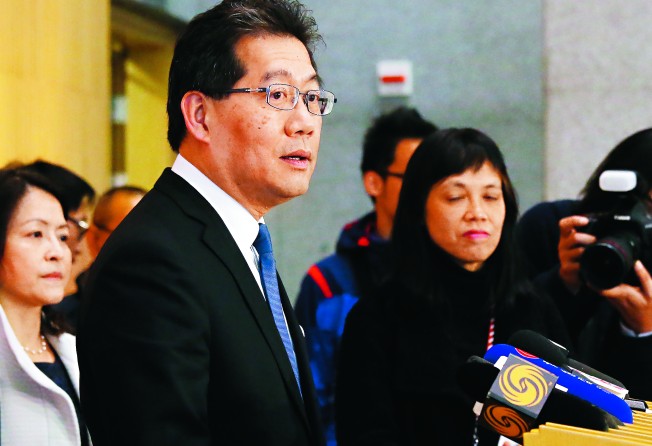Hong Kong government’s shelving of controversial copyright bill: what went wrong?
Mixture of flat-footed negotiating and pan-democrat filibuster put paid to latest attempt to reform laws on copyright

Pan-democratic lawmakers’ filibustering might be seen as the culprit for the government’s stalling the copyright amendment bill, but critics say officials were responding too slowly and passively throughout public debates about the law over the past few months.
The latest government failure is very similar to the last time it shelved the copyright amendment bill four years ago. Again, it takes place during a Legislative Council election year. Again, it meets fierce opposition from internet users who are highly skeptical of the government.
The only difference is that the government cannot technically shelve the bill this time as the second reading has resumed, meaning the government can only shuffle it to the back of its list of items for tabling to lawmakers in the rest of the legislative year, a government spokeswoman said.
As pan-democrats agreed, things had looked positive for the government when the bills committee of Legco was considering a number of exemptions that would protect internet users making use of copyrighted materials as “secondary creation”, by way of parody, pastiche and the like – categories currently exposed to criminal liabilities.
But late last year when the bill was put to all lawmakers for a second reading, things turned sour as online groups started rallying against the law, piling pressure on pan-democrats seeking re-election in a few months’ time.
Terming the bill “internet Article 23”, defectors compare the proposed copyright law to the Basic Law provision on national security that brought 500,000 protesters onto the streets in 2003.
“I think the government has failed to listen to the views of internet users,” said Glacier Kwong Chung-ching, a spokeswoman for protest group Keyboard Alliance.
She said she seldom met Secretary for Commerce Greg So, while the officials in charge – including deputy secretary for commerce and economic development David Wong Fuk-loi and director of intellectual property Ada Leung Ka-lai – were too passive during earlier negotiations.
“They initially were keen on asking us to reach a consensus with the copyright owners. They did not take the lead in proposing something with which all sides could start,” Kwong said.
This bill is not the first approach from the government to rewrite the copyright law, which is deemed one of the world’s most outdated. Ten years ago, the government started consultations on reform. The first bid to push for an amended version to the Copyright Ordinance came in 2011.
But Albert Chan Wai-yip proposed over 1,000 amendments to oppose the new law that he and many other critics on the internet saw as a threat to freedom of expression.
This time around, Chan again participated in the filibuster that finally led to the looming demise of the latest attempt.
What is different this time is that all pan-democrats in the legislature took part in the filibuster. While the only tool of filibuster was to raise motions last time, they invented a new way of delaying this time by leaving only one or two pan-democrats in the chamber and calling quorum bells whenever a number of pro-establishment lawmakers were absent.
“Initially not all the pan-democrats joined the filibuster this time. But as those who stayed behind in the chambers were highlighted by online groups, they had no choice but to join us,” Chan said.
Still, he said the latest bill was actually a “big improvement” from the old proposal, and said it was not So’s fault.
YEARS OF DISCUSSION ON COPYRIGHT
December 2006: The government launched a public consultation on “Copyright Protection in the Digital Environment”.
2008: The government unveiled preliminary proposals on copyright amendments and invited views about them.
Late 2009: A set of refined proposals was issued and tabled before the Legislative Council’s commerce and industry panel.
June 2011: First reading of the Copyright (Amendment) Bill 2011 in Legco
April 2012: The bills committee finished its work and second reading of the bill was scheduled to resume.
May 2012: The copyright bill was shelved at the 11th hour amid worries that political parodies and other creative works based on copyright materials might be banned.
July 2013: The government launched a new round of public consultation on a new copyright bill.
June 2014: First reading of the Copyright (Amendment) Bill 2014 in Legco
July 2014-November 2015: Bills Committee meetings on the copyright bill.
December 5, 2015: A gathering against the bill descended into chaos when a radical pan-democrat lawmaker was prevented from leaving the venue for more than an hour.
December 16, 2015: Copyright bill debate resumed in Legco, pan-democrats started filibustering.
February 25, 2016: Commerce minister said it will be “the end” of the bill if it is not passed by March 4.